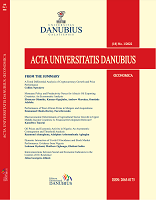Determinants of Industrial Development in Developing Countries: The Case of Nigeria
Determinants of Industrial Development in Developing Countries: The Case of Nigeria
Author(s): Ishola James Aransiola, Sunday Festus Olasupo, Cecilia Oluwakemi Ogunwole, Bamidele Pereowei Abalaba, Timothy Ayomitunde AderemiSubject(s): National Economy, Business Economy / Management, International relations/trade, Developing nations, Economic development
Published by: Editura Universitară Danubius
Keywords: Industrial Development; GDP; Population; FDI; Trade Openness;
Summary/Abstract: While examining various variables that could drive industrial development in Nigeria, thisstudy verified the contributions of market size, agricultural output, GDP growth rate, exchange rate,foreign direct investment inflows and trade openness to industrial development via empiricalinvestigation using annual data from 1990 to 2019. The study employed Fully Modified Ordinary LeastSquares (FMOLS) alongside Granger causality test to analyse the collected data. It is important to reportthe following as the pertinent findings that came out of this study; market size, agricultural output, tradeopenness, GDP growth rate and exchange rate are not strong variables that have the capacity to drive industrial development in Nigeria. This implies that these factors are not drivers of industrial development in Nigeria. However, FDI inflows is a weak driver of industrial development in Nigeria. In another page, the Granger causality results submitted that among all the determining variables paired with industrial development, it is only availability of huge market that is a vital condition for industrial development in the country. In view of the above, the study makes these recommendations for the Nigerian policymakers that industrial development in Nigeria requires the expansion of the country`s market size, production of sufficient agricultural product with value addition, expansion of the country`s GDP, controlling exchange rate, export promotion and attraction of more inflows of FDI in the country. Therefore, policy measures should be put in place by the Nigerian policymakers to facilitate the implementation of these recommendations in the country.
Journal: Acta Universitatis Danubius. Œconomica
- Issue Year: 18/2022
- Issue No: 6
- Page Range: 39-52
- Page Count: 14
- Language: English

